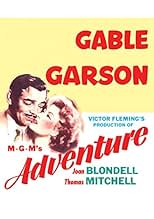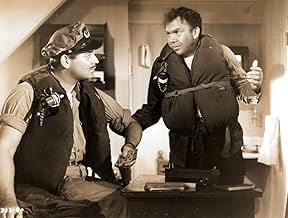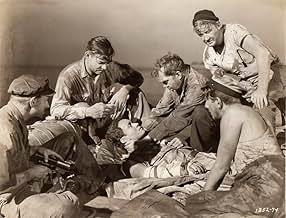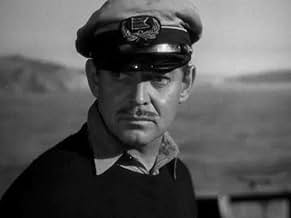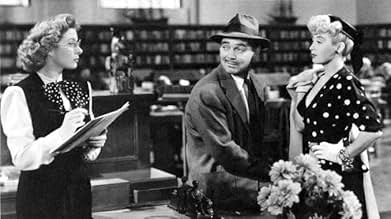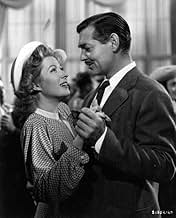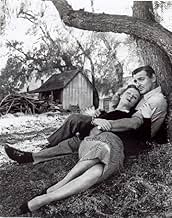AVALIAÇÃO DA IMDb
6,1/10
1,3 mil
SUA AVALIAÇÃO
Adicionar um enredo no seu idiomaDark, romantic, complicated drama about a rowdy merchant mariner and sophisticated librarian who clash over their lifestyles and values - and then fall in love.Dark, romantic, complicated drama about a rowdy merchant mariner and sophisticated librarian who clash over their lifestyles and values - and then fall in love.Dark, romantic, complicated drama about a rowdy merchant mariner and sophisticated librarian who clash over their lifestyles and values - and then fall in love.
- Direção
- Roteiristas
- Artistas
- Prêmios
- 2 vitórias no total
Stanley Andrews
- Bit Part
- (não confirmado)
Florence Auer
- Landlady
- (não confirmado)
Pedro de Cordoba
- Felipe
- (não confirmado)
Rex Ingram
- Preacher
- (não confirmado)
Garry Owen
- Jabbo
- (não confirmado)
Harry Wilson
- Big Mug
- (não confirmado)
Richard Abbott
- Clerk
- (não creditado)
Avaliações em destaque
"Adventure" is an oddly generic title for such a singularly unique motion picture. Its superficial values are appealing enough--the Gable bluster is rarely put to such good use, and Garson is possibly the only actress with enough mettle to match him--but these attributes are hardly unusual and neither, indeed, is the storyline. What makes the effort favorably surprising is the story's aspiration to allegory through the use of poetics, which may occasionally seem overt but which never fail to ring true. It's an ambitious undertaking, and it works.
In its time, the movie was dismissed for being both formulaic and even crude, which in itself betrays either an ignorance of its higher aspirations or, more likely, a reluctance to take them seriously. America in 1945 prided itself on street smarts and industrial might; on its not being taken for a sucker. It had saved Europe from the axis forces and was about to embark on a socioeconomic boom such as the world had never seen: It wasn't interested in philosophical musings about the nature of the soul. The idea that these musings could be given dimension in a simple and often predictable story about a rakish sailor and a repressed librarian drove reviewers to pronounce the script "foolish" and the poetic commentary "gibberish."
But it is these very elements, this oddly ardent coloring, that have somehow deepened and mellowed with time, and which now provide the film with the kind of rich, subtle flavor found in only the most treasured vintages. More unique still is that the movie is less interested in the sentimentality of its story than in the metaphysical questions it poses. Its chief accomplishment is in avoiding any academic exploration of such questions (a choice which parallels the arc of the story itself), and it does so by illustrating with large, colorful brushes. Only the intelligence of the director and the skill of his actors keep the proceedings from veering off into caricature, a tipping point that when straddled with such finesse is delightful viewing indeed.
In its time, the movie was dismissed for being both formulaic and even crude, which in itself betrays either an ignorance of its higher aspirations or, more likely, a reluctance to take them seriously. America in 1945 prided itself on street smarts and industrial might; on its not being taken for a sucker. It had saved Europe from the axis forces and was about to embark on a socioeconomic boom such as the world had never seen: It wasn't interested in philosophical musings about the nature of the soul. The idea that these musings could be given dimension in a simple and often predictable story about a rakish sailor and a repressed librarian drove reviewers to pronounce the script "foolish" and the poetic commentary "gibberish."
But it is these very elements, this oddly ardent coloring, that have somehow deepened and mellowed with time, and which now provide the film with the kind of rich, subtle flavor found in only the most treasured vintages. More unique still is that the movie is less interested in the sentimentality of its story than in the metaphysical questions it poses. Its chief accomplishment is in avoiding any academic exploration of such questions (a choice which parallels the arc of the story itself), and it does so by illustrating with large, colorful brushes. Only the intelligence of the director and the skill of his actors keep the proceedings from veering off into caricature, a tipping point that when straddled with such finesse is delightful viewing indeed.
In his first film after World War II service in the Army Air Corps, Clark Gable settled down to a familiar character and one of his most familiar directors. Adventure was the last of five films that Gable did with Victor Fleming which also includes Gone With The Wind. This one never quite measured up to Gone With The Wind though.
Gable was literally met at the airport by Louis B. Mayer and rushed into this film. It was thought at the time that a film with current box office sensation Greer Garson was a can't miss item at the box office. Garson was coming off an Oscar she received in 1942 for Mrs. Miniver the year Gable went away to war.
The results were underwhelming, but seen over 60 years after it was first out show Adventure to be not a bad story at all. Gable fits comfortably into the part of the tough boatswain who loves the rollicking life at sea he leads. No woman is going to be tying him down, not one like prim and proper librarian Greer Garson. He likes them like her roommate Joan Blondell, sassy and out for a good time.
But Greer and her notions of settling down with home and family kind of get under his skin. It's what's led many a man to the altar.
Gable and Garson never worked together again, probably by mutual consent. Neither were each other's types on the screen and in life, but no one has anything to be ashamed of in Adventure.
Best performance in the cast is by Thomas Mitchell as Gable's friend and confidante. Mitchell plays the usual tragicomic alcoholic that he took a patent out on for the screen.
Another in the cast and former vocalist with the Xavier Cugat Orchestra is Lina Romay who is the woman we first see Gable with as the film opens. She would shortly be joining the Bing Crosby show as the featured female singer. That 'dame' who gets $20.00 for some conversation is none other than Barbara Billingsley aka June Cleaver. Who'd have thunk that one?
Though this one didn't set the world on fire, Gable's next two films, Homecoming and The Hucksters rank in my humble opinion as two of his very best. The King was ascending his throne again.
Gable was literally met at the airport by Louis B. Mayer and rushed into this film. It was thought at the time that a film with current box office sensation Greer Garson was a can't miss item at the box office. Garson was coming off an Oscar she received in 1942 for Mrs. Miniver the year Gable went away to war.
The results were underwhelming, but seen over 60 years after it was first out show Adventure to be not a bad story at all. Gable fits comfortably into the part of the tough boatswain who loves the rollicking life at sea he leads. No woman is going to be tying him down, not one like prim and proper librarian Greer Garson. He likes them like her roommate Joan Blondell, sassy and out for a good time.
But Greer and her notions of settling down with home and family kind of get under his skin. It's what's led many a man to the altar.
Gable and Garson never worked together again, probably by mutual consent. Neither were each other's types on the screen and in life, but no one has anything to be ashamed of in Adventure.
Best performance in the cast is by Thomas Mitchell as Gable's friend and confidante. Mitchell plays the usual tragicomic alcoholic that he took a patent out on for the screen.
Another in the cast and former vocalist with the Xavier Cugat Orchestra is Lina Romay who is the woman we first see Gable with as the film opens. She would shortly be joining the Bing Crosby show as the featured female singer. That 'dame' who gets $20.00 for some conversation is none other than Barbara Billingsley aka June Cleaver. Who'd have thunk that one?
Though this one didn't set the world on fire, Gable's next two films, Homecoming and The Hucksters rank in my humble opinion as two of his very best. The King was ascending his throne again.
I'm giving this movie 6 stars for the sheer pleasure of looking at Greer Garson, one of my favorites.
But I'd put this movie alongside "Remember?" as the weakest Garson films. For me, the problem was Clark Gable.
Gable is given the kind of typical "rough guy the dames falls for" role that made him a star...a combination of bluster and charm that won over Jean Harlow or Myrna Loy or Claudette Colbert.
Here, I think it's too much bluster and too little charm to realistically connect with Garson in the role she's given.
One pleasure here is seeing Joan Blondell -- she did lots of good work after the '30s musicals that she's best remembered for.
Also good: Thomas Mitchell.
Overall: see it once for the novelty of it, or skip it altogether,
But I'd put this movie alongside "Remember?" as the weakest Garson films. For me, the problem was Clark Gable.
Gable is given the kind of typical "rough guy the dames falls for" role that made him a star...a combination of bluster and charm that won over Jean Harlow or Myrna Loy or Claudette Colbert.
Here, I think it's too much bluster and too little charm to realistically connect with Garson in the role she's given.
One pleasure here is seeing Joan Blondell -- she did lots of good work after the '30s musicals that she's best remembered for.
Also good: Thomas Mitchell.
Overall: see it once for the novelty of it, or skip it altogether,
I'm 65 and I have appreciated Gable's contributions over his career. I did not see Adventure on the silver screen but only this afternoon on TV, and so I cannot think back to how it was received at the time. Our mindsets are different now, anyway, and so I'm now wondering whether anyone else today besides me becomes worn down by his dialog? I'm sorry, but his constant barking finally got to me and I had to turn this one off. What's he doing anyway, schtik? I can imagine his answering even "one lump or two?" in high dudgeon. That just gets tiresome after a while, until such affectation of anger, indignation, resentment or whatever degenerates almost into buffoonery. Not everything has to be expressed frankly, my dear.
Gable and Garson make for a poor pairing in this overlong limp love story that goes in circles for over two hours. Gable fresh from war service looks like he's aged considerably and his tired abrasive performance shows it.
Harry Patterson (Gable) has a girl in every port and plans never to get tied down. Wandering into a library with a shipmate friend he meets staid and proper librarian Emily Sears (Garson) who is at first put off by the lug but opposites are known to attract and they ending up running off to Reno and getting hitched. But Harry's no land lubber and the two split up but not before Emily gets knocked-up. An oblivious Harry goes back to sea and his old ways but it just ain't the same.
There is little finesse to be found in Gables performance, just bluster. He does a lot of jabbering and doesn't really connect with anyone in the film. Garson's Emily on the other hand is too delicate and restrained to do a one-eighty. Victor Fleming's direction is loose and uninspired and the production values erratic with some terrible back projection.
"Gable's back and Garson's got'em" went the phrase back then but after seeing this you can keep them.
Harry Patterson (Gable) has a girl in every port and plans never to get tied down. Wandering into a library with a shipmate friend he meets staid and proper librarian Emily Sears (Garson) who is at first put off by the lug but opposites are known to attract and they ending up running off to Reno and getting hitched. But Harry's no land lubber and the two split up but not before Emily gets knocked-up. An oblivious Harry goes back to sea and his old ways but it just ain't the same.
There is little finesse to be found in Gables performance, just bluster. He does a lot of jabbering and doesn't really connect with anyone in the film. Garson's Emily on the other hand is too delicate and restrained to do a one-eighty. Victor Fleming's direction is loose and uninspired and the production values erratic with some terrible back projection.
"Gable's back and Garson's got'em" went the phrase back then but after seeing this you can keep them.
Você sabia?
- CuriosidadesAny reports of this film's financial failure are false. Variety (January 8, 1947) listed it as the #7 box office hit of 1946. (It was released December 28, 1945.) The film earned more than $6M worldwide and earned a profit for MGM.
- Erros de gravaçãoWhen the Buckleys drive away from Emily's house in the country, a clear reflection of the boom microphone can be seen on the right rear passenger window and other areas of the highly-polished car as it drives off.
- Citações
Harry Patterson: There ain't a dame I can't forget in six months.
- ConexõesFeatured in Clark Gable: Tall, Dark and Handsome (1996)
- Trilhas sonorasDown in the Valley
(a.k.a. "Birmingham Jail")(uncredited)
Principais escolhas
Faça login para avaliar e ver a lista de recomendações personalizadas
- How long is Adventure?Fornecido pela Alexa
Detalhes
Bilheteria
- Orçamento
- US$ 3.500.000 (estimativa)
- Tempo de duração2 horas 5 minutos
- Cor
- Proporção
- 1.37 : 1
Contribua para esta página
Sugerir uma alteração ou adicionar conteúdo ausente


